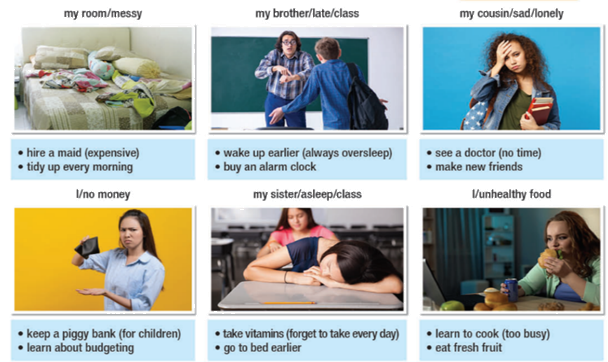Đừng bỏ lỡ những tính năng hấp dẫn của Baitap365.com
In pairs: What is happening in the picture? What skills will you need if you go to study in a different city or country? a. Read the words and definitions and fill in the blanks. Listen and repeat. b. In pairs: Use the new words to talk about the skills that you have and the skills that you'd like to learn. a. Listen to two first-year university students talking. Does Jill think Matt has good tips? b. Now, listen and answer the questions.
Let's Talk!
In pairs: What is happening in the picture? What skills will you need if you go to study in a different city or country?
(Theo cặp: Những gì đang xảy ra trong bức tranh? Bạn sẽ cần những kỹ năng gì nếu bạn đi học ở một thành phố hoặc quốc gia khác?)

New Words - a
a. Read the words and definitions and fill in the blanks. Listen and repeat.
(Đọc các từ và định nghĩa và điền vào chỗ trống. Lắng nghe và lặp lại.)
budgeting: the process of making and following a plan for spending your money
(lập ngân sách: quá trình lập và tuân theo kế hoạch chi tiêu tiền của bạn)
society: a group of people who join together to share a hobby or interest
(xã hội: một nhóm người tham gia cùng nhau để chia sẻ sở thích hoặc sở thích)
deadlines: points in time by which tasks must be finished
(thời hạn: thời điểm mà nhiệm vụ phải được hoàn thành)
remind: help remember something that you must do
(nhắc nhở: giúp ghi nhớ một cái gì đó mà bạn phải làm)
time management: the ability to use your time effectively or productively, especially at work
(quản lý thời gian: khả năng sử dụng thời gian của bạn một cách hiệu quả hoặc năng suất, đặc biệt là trong công việc)
Most young people are excited about moving out and starting a new life on a university or college campus. But first, you will need to learn many basic skills.
You will need to learn domestic skills. Your parents won't be there to cook for you or wash your clothes. No one will fix the broken light for you. You'll need to learn how to do all these things.
At university, you'll probably have (1)_deadlines to complete your essays and assignments so (2) ____________ is also important. Plan ahead and (3) _________ yourself about tasks that need to be finished.
Another skill students need to learn is (4) _____________ to make sure to have enough money to pay for important things like food and study books. Think carefully before you buy anything and try to save money.
At university, you'll meet lots of new people and building relationships is another important life skill. Joining a (5) ___________ where you can share an interest such as sport or drama with other students can help you make friends easier.
These life skills will help you have healthy and happy university life.
New Words - b
b. In pairs: Use the new words to talk about the skills that you have and the skills that you'd like to learn.
(Theo cặp: Sử dụng những từ mới để nói về những kỹ năng mà bạn có và những kỹ năng mà bạn muốn học.)
I'm not very good with money, so I'd like to learn about budgeting.
(Tôi không giỏi về tiền bạc lắm, vì vậy tôi muốn tìm hiểu về lập ngân sách.)
Listening - a
a. Listen to two first-year university students talking. Does Jill think Matt has good tips?
1. yes (có)
2. no (không)
Listening - b
b. Now, listen and answer the questions.
(Bây giờ, hãy lắng nghe và trả lời các câu hỏi.)
1. What must Jill do tonight?
(Tối nay Jill phải làm gì?)
2. What did Matt suggest Jill buy?
(Matt đã đề nghị Jill mua gì?)
3. Where does Matt put his notes?
(Matt để ghi chú ở đâu?)
4. What does Matt use to remind himself a few days before deadlines?
(Matt sử dụng điều gì để nhắc nhở bản thân vài ngày trước thời hạn?)
5. What's Matt's last tip for Jill?
(Lời khuyên cuối cùng của Matt dành cho Jill là gì?)
Listening - c
c. Read the Conversation Skill box. Then, listen and repeat.
(Đọc hộp Kỹ năng đàm thoại. Sau đó, nghe và lặp lại.)

Listening - d
d. Now, listen to the conversation again and circle the repeated phrase you hear.
(Bây giờ, hãy nghe lại đoạn hội thoại và khoanh tròn cụm từ lặp đi lặp lại mà bạn nghe được.)
… deadline is tomorrow … (…hạn chót là ngày mai…)
... notes door and mirror… (... ghi chú cửa và gương...)
Listening - e
e. In pairs: What do you think about Matt's suggestions? Would they be useful for you? Why (not)?
(Theo cặp: Bạn nghĩ gì về gợi ý của Matt? Họ sẽ hữu ích cho bạn? Tại sao không)?)
Grammar Meaning and Use - a

a. Look at the picture. What do you think the girls are saying?
(Nhìn vào bức tranh. Bạn nghĩ những cô gái đang nói gì?)

Grammar Meaning and Use - b
b. Now, listen and check your ideas.
(Bây giờ, hãy lắng nghe và kiểm tra ý tưởng của bạn.)
I’m always late to class. (Tôi luôn đến lớp muộn.)
Why don’t you get up earlier? (Tại sao bạn không dậy sớm hơn?)
Grammar Meaning and Use - c
c. Listen and repeat.
(Lắng nghe và lặp lại.)
I’m always late to class. (Tôi luôn đến lớp muộn.)
Why don’t you get up earlier? (Tại sao bạn không dậy sớm hơn?)
Grammar Form and Practice - a

a. Unscramble the sentences.
1. A: I don't know how I'm going to make new friends.
B: some/Why/societies?/student/don't/join/you
Why don't you join some student societies?
2. A: How should I cook these eggs?
B: an/make/Why/you/omelet?/don't
3. A: I think you should sign up for cookery classes.
B: I don't think so. I'm too busy.
A: from/Why/videos?/watching/to/don't/cook/learn/you
4. A: Jane gets angry too easily.
B: up/Why/for/sign/in/doesn't/class/stress management?/a/she
5. A: I never have enough money when it's time to pay the electricity bill.
B: Me too.
A: Why/online course/we/don't/an/take/in/budgeting?
Grammar Form and Practice - b
b. Match the problems to the suggestions and write sentences.
(Nối các vấn đề với các gợi ý và viết câu.)

1. Why don't you sign up for a website design course?
2. __________________________________________
3. __________________________________________
4. __________________________________________
5. __________________________________________
Grammar Form and Practice - c
c. In pairs: What kind of life problems have you experienced? How did you solve them?
(Những loại vấn đề cuộc sống bạn đã trải qua? Làm thế nào bạn giải quyết chúng?)
Pronunciation - a

Pronunciation - b
b. Listen to the sentence and focus on how the intonation rises.
(Nghe câu và tập trung vào cách ngữ điệu tăng lên.)
Why don't you wake up earlier? (Tại sao bạn không thức dậy sớm hơn?)
Pronunciation - c
c. Listen and cross out the sentence with the wrong intonation.
(Nghe và gạch bỏ câu có ngữ điệu sai.)
Why don't you make an omelet? (Tại sao bạn không làm món trứng tráng?)
Why don't you keep a diary?( Tại sao bạn không giữ một cuốn nhật ký?)
Pronunciation - d
d. Read the sentences with the correct intonation to a partner.
(Đọc các câu với ngữ điệu chính xác cho đối tác.)
Practice - a
a. Student A: Tell your partner about your problem. Politely disagree with their suggestion and give a reason why. Student B: Listen to your partner's problem and make a casual suggestion. Make an alternative suggestion if they disagree. Swap roles and repeat.
(Học sinh A: Nói với đối tác của bạn về vấn đề của bạn. Lịch sự không đồng ý với đề xuất của họ và đưa ra lý do tại sao. Học sinh B: Lắng nghe vấn đề của đối tác của bạn và đưa ra một gợi ý thông thường. Đưa ra một gợi ý thay thế nếu họ không đồng ý. Trao đổi vai trò và lặp lại.)
My room is so messy. (Căn phòng của tôi bừa bộn quá.)
Why don't you hire a maid? (Tại sao bạn không thuê một người giúp việc?)
I don't think so. That's too expensive. (Tôi không nghĩ vậy. Đó là quá đắt.)
Why don't you clean up every morning? (Tại sao bạn không dọn dẹp mỗi sáng?)

Practice - b
b. Practice with your own ideas.
(Thực hành với ý tưởng của riêng bạn.)
Speaking - a
Speaking GETTING BETTER AT LIFE (Trở nên tốt hơn trong cuộc sống)
a. You're planning an article for Campus Life magazine to help new students live independently. In pairs: Look at the problems and make suggestions to solve each one.
(Bạn đang lên kế hoạch viết một bài báo cho tạp chí Cuộc sống sinh viên để giúp sinh viên mới sống độc lập. Theo cặp: Nhìn vào các vấn đề và đưa ra gợi ý để giải quyết từng vấn đề.)
Some students keep missing essay deadlines. (Một số sinh viên liên tục bỏ lỡ thời hạn viết luận.)
Why don't they write down deadline dates in a diary? (Tại sao họ không ghi ngày hết hạn vào nhật ký?)
I don't think so. Not many students have diaries. (Tôi không nghĩ vậy. Không nhiều sinh viên có nhật ký.)
Why don't they use them to remind themselves of smartphones themselves?
(Tại sao họ không sử dụng chúng để tự nhắc nhở điện thoại thông minh?)

Speaking - b
b. Which suggestions for the problems do you think are the most effective? Why?
(Những gợi ý cho các vấn đề bạn nghĩ là hiệu quả nhất? Tại sao?)
Mẹo tìm đáp án nhanh
Search Google: "từ khóa + baitap365" Ví dụ: "Bài 5 trang 13 SGK Vật lí 12 baitap365